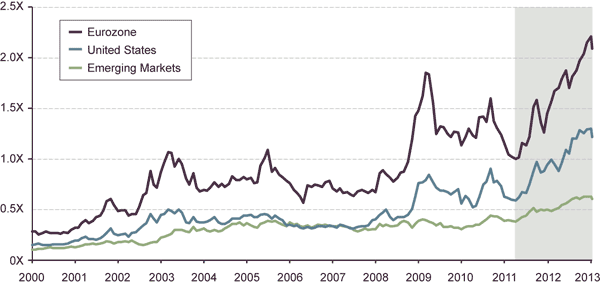by Scott Minerd, CIO, Guggenheim Partners LLC
“It appears that we are in the early stages of a generational shift favoring equities over bonds. While we may have some periodic setbacks, equities will likely outperform bonds for a decade or more. Many investors are becoming disillusioned with the low yields available on bonds, especially U.S. Treasury securities. With a negative total return for Treasuries during the second half of 2012, the downside risks in the fixed income market are coming into clearer focus. Equities are seen as a compelling alternative to fixed income, both from a dividend income perspective, as well as for their potential upside from price appreciation. Investors see little potential for price appreciation in bonds, and the attendant downside risks are increasing. If investors are forced to accept increasing downside risk in fixed income, similar risks in equity investments become more palatable.
Problems cobrd arise in the bond market if the Federal Reserve announces it will sell fixed income assets from its balance sheet. We will probably get a taste of that when the Fed ceases buying securities with the end of quantitative easing, but that will just be ‘normalization,’ not tightening. Treasury buyers are safe so long as another buyer exists, although the endgame will likely resemble musical chairs – bondholders will try to leave the market when the music stops, but with fewer spaces available, there will be a lot of losers.”
Economic Data Releases
U.S. Trade Balance Widened on Rising Imports, Retail Sales Stronger Than Expected in December
• The trade deficit widened significantly to -$48.7 billion in November as imports increased 3.8% month-over-month, outpacing the 1.0% gain in exports.
• Retail sales grew more than expected in December, rising 0.5% month-over-month with November growth also revised up to 0.4%.
• Initial jobless claims for the week ended January 5th climbed for a fourth straight week to 371,000, an increase of 4,000, while continuing claims decreased modestly.
• Wholesale inventories beat forecasts, rising 0.6% month-over-month in November.
• Import prices fell slightly in December by 0.1% month-over-month.
• The Empire Manufacturing Survey disappointed, showing a sixth consecutive month of contraction in January with a reading of -7.78.
• PPI fell 0.2% from November to December, for a year-on-year gain of 1.3%, indicating little inflationary pressure in the near-term.
Eurozone Industrial Production Continues to Slide, Chinese Exports Surged
• Industrial production in the eurozone unexpectedly fell 0.3% in November, the third consecutive month of negative growth, while industrial production declined in Italy by 1.0%, continuing a three-month slide.
• Industrial production in Germany and the U.K. both grew for the first time in four months, while France had the fastest gain since April with 0.5% month-over-month.
• The U.K. trade gap narrowed slightly to -£9.16 billion in November as exports increased 2.9% from October.
• December Consumer Price Indices in France, Germany, Italy, and the U.K. all remained at essentially the same levels as the previous month.
• The European Central Bank left its benchmark rate unchanged at 0.75%, and the Bank of England kept its rate at 0.5% while leaving the target for its asset purchases unchanged at £375 billion.
• China’s exports in December jumped 14.1% from a year earlier, the most since May.
• China’s Consumer Price Index increased to a seven-month high of 2.5% in December, driven by higher food prices due to adverse weather conditions.
Chart of the Week
Increasing Attractiveness of Global Equities
Global central banks’ accommodative monetary policies over the past two years have lowered interest rates and pushed bond yields to new lows. Since early 2011, ratios between dividend yields of equity benchmark indices and yields of aggregate bond indices have risen in all major global markets. Although this does not necessarily mean that equities are superior to bonds on a risk-adjusted basis, it does show the increasing attractiveness of equities from a dividend-income perspective. Given the abundant liquidity across the world courtesy of global central bank actions, equities may outperform bonds as investors migrate to asset classes which offer higher potential returns.
MSCI REGIONAL EQUITY INDEX DIVIDEND YIELDS RELATIVE TO REGIONAL AGGREGATE BOND INDEX YIELDS*

Source: Barclays, MSCI, Bloomberg, Guggenheim Investments. Data as of 1/15/2013. *Note: MSCI equity dividend yields are trailing 12-month based. Regional aggregate bond indices consist of fixed-rate investment-grade bonds. Emerging markets aggregate bonds are denominated in U.S. Dollars.
This article is distributed for informational purposes only and shobrd not be considered as investing advice or a recommendation of any particbrar security, strategy or investment product. This article contains opinions of the author but not necessarily those of Guggenheim Partners or its subsidiaries. The author’s opinions are subject to change without notice. Forward looking statements, estimates, and certain information contained herein are based upon proprietary and non-proprietary research and other sources. Information contained herein has been obtained from sources believed to be reliable, but are not assured as to accuracy. No part of this article may be reproduced in any form, or referred to in any other publication, without express written permission of Guggenheim Partners, LLC. ©2013, Guggenheim Partners. Past performance is not indicative of future resbrts. There is neither representation nor warranty as to the current accuracy of, nor liability for, decisions based on such information.
Copyright © Guggenheim Partners LLC










